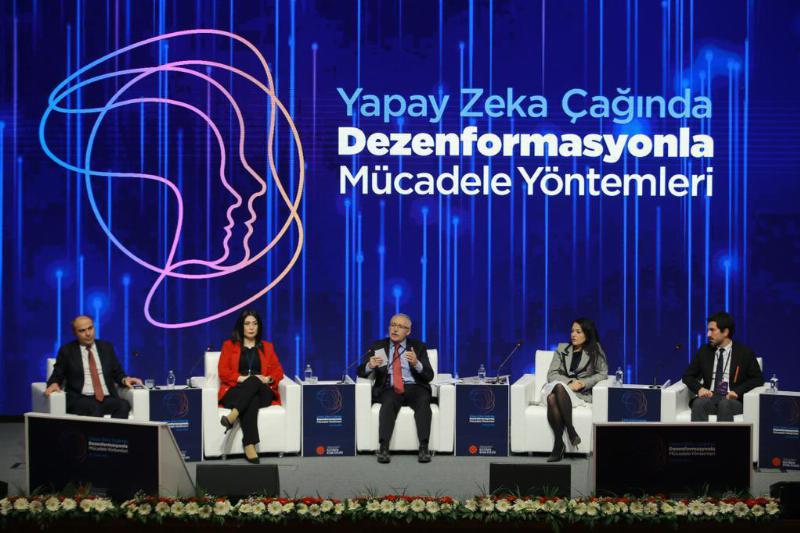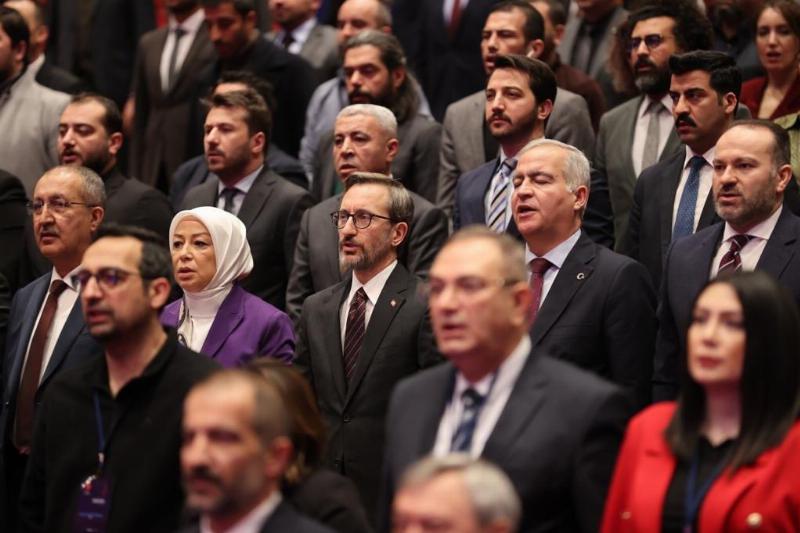Üsküdar University Faculty of Communication Instructor Assoc. Prof. Aylin Tutgun Ünal participated in the "Methods of Fighting against Disinformation in the Age of Artificial Intelligence" panel organized by the Presidential Communications Directorate's Center for Fighting Disinformation. In the panel, topics titled "The Use of Technology to Fight Disinformation", "Artificial Intelligence and OSINT", "Journalism, Fake News and Disinformation" and "Social Media, Algorithms and Disinformation" were discussed. Presidential Communications Director Fahrettin Altun made the opening remarks in the panel themed "Methods of Fighting against Disinformation in the Age of Artificial Intelligence" which was held at the Directorate.

After the opening speeches, Idris Kardaş, Coordinator of the Center for Fighting Disinformation, gave his speech on the panel and Kardaş said “How can we use technology in the fight against disinformation? Could artificial intelligence be effective for this purpose? How social media algorithms spread disinformation? As the Directorate of Communications, we discuss these questions in this panel.”.

In the second session moderated by İdris Kardaş, journalists and academics discussed professional ethics, perception operations, fake news and disinformation.
Üsküdar University Faculty of Communication Instructor Assoc. Prof. Aylin Tutgun Ünal, academician Assoc. Prof. Başak Gezmen and journalists Abdülkadir Selvi and Ömer Faruk Gökçin were also among the panelists.
While discussing the role of social media and algorithms in the spread of disinformation, Assoc. Prof. Aylin Tutgun Ünal made important evaluations on the topic of "Fake News".
Legal regulations involving social media have been put into operation in many countries
Assoc. Prof Aylin Tutgun Ünal said in her speech at the panel; “Legal regulations covering social media channels were made in countries such as Germany, England, Australia, Russia and China in previous years, and criminal sanctions are currently being imposed. Individuals or institutions may be penalized in case of non-compliance with legal regulations, such as considering the complaint notifications made by people on social media, removing illegal content from social media within 24 hours, considering personality violations in content that damages reputation or is published without permission.”.
Ünal said, “Thanks to the law that came into force in Germany in 2018, Facebook was the first to be penalized in 2019. The government fined Facebook 2 million euros for failing to adequately report illegal activity on its platforms in Germany. Within the framework of this law, the maximum fine for individuals is 5 million euros and 50 million euros for companies.”.
Stalking is a crime!
Stating that "Stalking" was considered a crime before the social media law in Germany in 2017, Assoc. Prof. Aylin Tutgun Ünal, “According to Article 238 of the German Penal Code, stalking is a crime. A harassing person who stalks, spies on, persistently seeks to contact a person by phone or other means, and seriously restricts and harms the life of the person molested, is punished with a fine or imprisonment of up to three years, according to Article 238 of the Penal Code. In cases that would constitute a crime, one is sentenced to imprisonment of up to five years.”.
Disinformation law came to the fore after the violent content in England
Reminding that the law of disinformation came to the fore after the incident of a 14-year-old girl who took her own life after watching violent videos in England, Assoc. Prof. Aylin Tutgun Ünal said, “Even though the government announced that the media control agency Ofcom's supervisory authority over social media platforms could be increased, studies on regulations continue. Legislators are demanding that content that may fall into categories such as violent, terrorism-related, cyberbullying and child abuse be removed quickly. Penalties are also included in the plans for companies that do not comply.”.
Social media law in Australia came into effect earlier
Assoc. Prof. Aylin Tutgun Ünal said, “In Australia, two separate legal regulations were made that define the responsibilities of social media companies regarding the content produced and include criminal sanctions in 2015 and 2019. After a suicide case in 2014, these arrangements came to the fore. A year after the TV presenter took her own life after being exposed to cyberbullying on Twitter, the first legal regulation was made. The eSafety Commissioner, created under the law, was authorized to request that they remove content that insults or humiliates others from social media platforms. It is foreseen that those who publish the content will be fined up to 60,000 euros and the companies that do not remove these contents within 48 hours, will be fined up to 300 thousand euros.”.
News with disinformation content is a complete enemy of truth
Assoc. Prof. Aylin Tutgun Ünal said, “Why is disinformation applied to? When we look for an answer to the question, we come across the motivations of 'attracting attention', 'impressing others', and 'having fun'. In many news presented in digital media, disinformation is used today for purposes such as attracting attention, more clicks and perception management. News with disinformation content, which aims to discredit people or institutions or to generate advertising revenue, is a complete enemy of truth. Since the social effects of these anti-truth news shared on social media are strong, it harms individuals, institutions, the country in the big picture, and even casts a shadow on the country's reputation around the world.”.
Stating that search engines such as Google managed to be a part of perception management thanks to the algorithms they contain, Ünal continued her remarks as follows:
“As a result of the searched keywords, it brings up what it was taught. Today, both search engines and social media channels play a role in the country's position around the world. In this sense, the function of artificial intelligence algorithms can be used for good or bad. Not only social media, but also search engines and algorithms are among the reasons that bring the need to take precautions. As with the legal measures in other countries, disinformation will be overcome with the continuation of social media law regulations and the spread of digital media literacy educations in our country.”.
Üsküdar News Agency (ÜNA)

